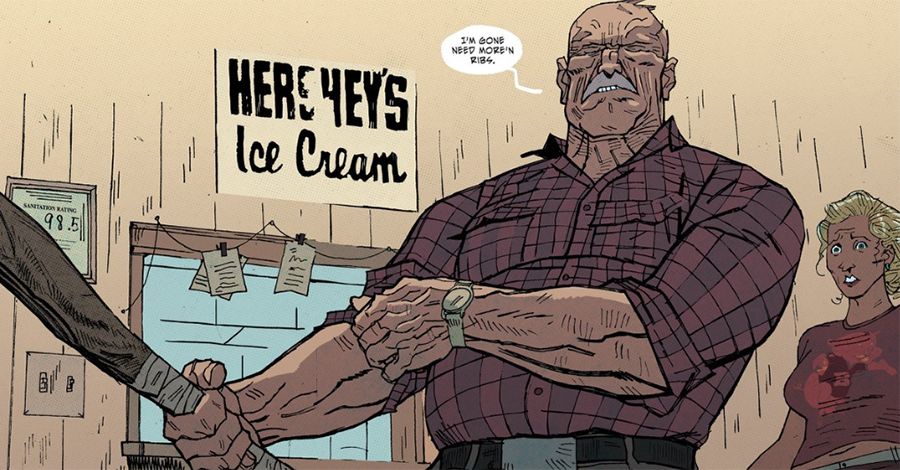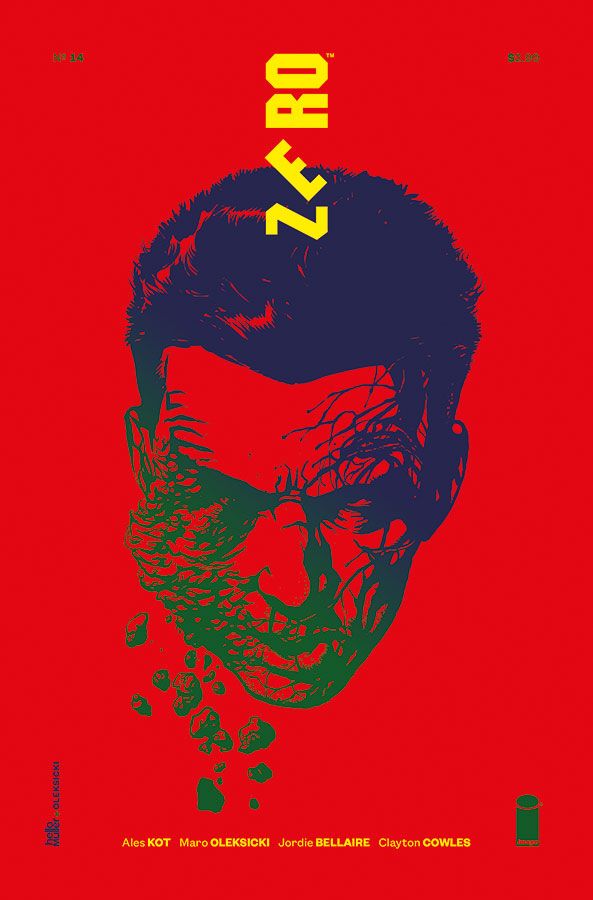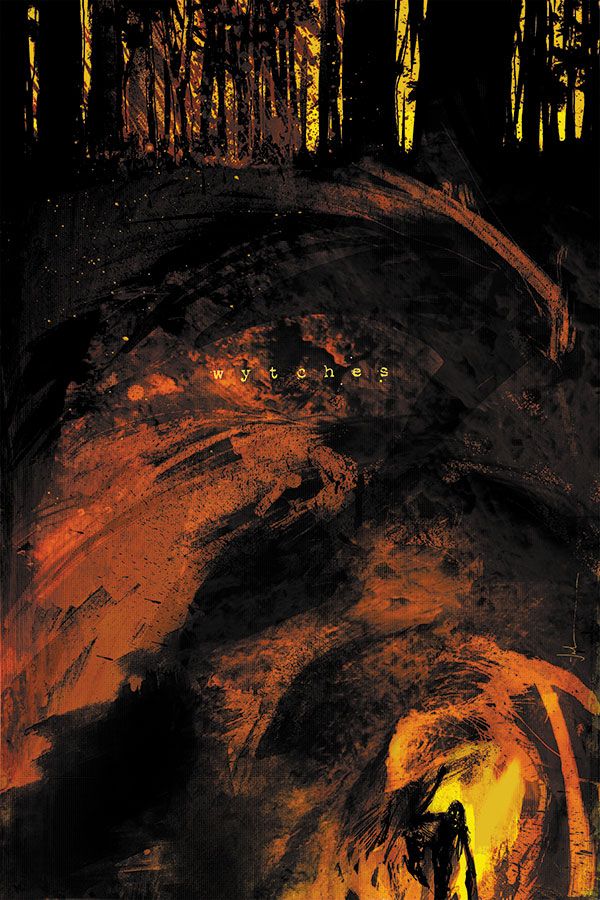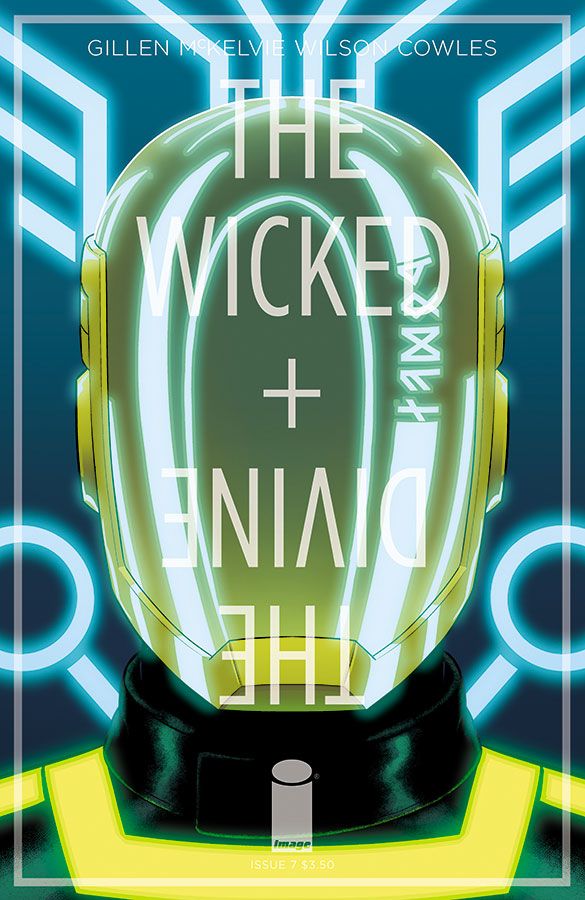Attendees of Leeds' Thought Bubble comic con were treated to a double dose of Image panels on Saturday afternoon. Immediately following I is For Inspiration: The Artists of Image Comicst panel came I is For Innovation: The Writers of Image Comics panel. If the artist panel had a full room, then the writer panel had an even more crowded one, with people standing in the aisles for a chance to hear from the assembled scribes. At the start, though, that panel was made up only of Jason Aaron ("Southern Bastards"). Sitting down with moderator and Image publisher Eric Stephenson, Aaron joked, "if nobody else shows up, does that mean I'm writing [Scott Snyder's] 'Wytches' now?"
Stephenson decided to start the panel regardless, asking Aaron where he started out in comics. Aaron began with a project at Image imprint Top Cow writing a series called "Ripclaw," which was one of six comics put into competition with one another. His came dead last, he recalled, but he went on to make a other comics, including his long-running crime series "Scalped" at Vertigo. When that series ended he moved to Marvel but missed "having characters to do bad things to." That's where "Southern Bastards" came in.
"I am a Southern bastard, and so is [artist] Jason [Latour]," he said, and now they both have a chance to put everything they feel on a comics page. Stephenson noted that this had been in the works for quite some time, and Aaron agreed. The two revealed that "as the only two dudes in comics who like American football, we tended to gravitate to one another." Stephenson said that what appealed to him about "Southern Bastards" was that it wasn't like anything else in comics.
At that point, Aaron was joined onstage by Scott Snyder ("Wytches"), Ales Kot ("Zero") and Kieron Gillen ("The Wicked + The Divine") who apologized for being a little delayed. Antony Johnston ("Umbral") and Richard Starkings ("Elephantmen") arrived shortly thereafter, completing the line-up of panelists.
Aaron & Latour's "Southern Bastards" Gets Bloody In Second Arc
Stephenson asked Snyder about his last few years in comics. Snyder has been exclusive at DC for a while but had wanted to get back to doing some creator-owned projects as well. When his exclusive contract came to an end, he decided to bring his next book to Image. Snyder came to Image with four or five ideas for projects, only to be surprised when Image said "whichever you want to do most." That ended up being the suburban horror series "Wytches."
Stephenson said this was something that comes up a lot with creators heading to Image. There are no parameters to what they can do. Image always says, "do whatever book you want to do," and don't place restrictions on the story. Starkings said that he knew firsthand that this was true, and the evidence was his new series with Shaky Kane called "The Beef," which is about cows and a man who turns into beef.
With the entire panel now gathered, Stephenson addressed his first question to them all: "Why were you all so fucking late?!" -- to which Starkings replied, "Why were you all so early?"
Stephenson turned next to Johnston and the upcoming final issues of "Umbral" volume two. Johnston said that issue #10 came out recently and then there'll be two more issues after that which will finish the second storyline. The same is true of his other series, "The Fuse," which will also round out the current storyline next year. Both are scheduled to return in 2015, although he wasn't sure which would be back first.
Stephenson asked Johnston how he goes about separating himself between the two books, which are both very different in genre. Johnston replied, "I almost got pigeonholed early on in my career as 'a horror guy'" -- a genre he loves writing in. He decided to make a concerted effort to move away from horror for a while and do something else. As he also works as writer for video games, he finds that he's starting to get used to the idea of switching gears from one project to another.
Following that line of thought, Stephenson turned his attention to Kot, whose projects are all completely different from one another. "Is that your goal?" he asked. "Yes," replied Kot, simply. The writer said that if he can see too far into the future of a story, he gets a little disappointed with it and it won't surprise him -- and he enjoys that sense of surprise. He said he listens to a lot of break metal -- music which bombards the listener with "all these different streams of data" which are discordant but start to fall into a rhythm if you listen long enough. He compared that to the way he makes comics; he doesn't want to have too much planned in advance, but rather lets his stories unfold.
Johnston added that it really depends on how much you enjoy what you're writing. When you work on a project you aren't enjoying, it can become very difficult to switch between various stories. If it's something he's really enjoying, he finds the switch easier to make. Kot agreed, saying that "it shows when a writer is enthusiastic -- you can see it in the work."
Stephenson next spoke to Gillen about "The Wicked + The Divine," which he described as a "progression" of Gillen and Jamie McKelvie's previous work on "Phonogram." Gillen joked that where others worked to make all their comics different, "we're trying to make all our comics the same!" Gillen said that his current series with frequent collaborators Jamie McKelvie, Matt Wilson and Clayton Cowles feels at times like a culmination of their work -- "setting fire to it all, but also a celebration of everything." He finds that sometimes stories aren't quite what you think they are and that things have a tendency to change on you.
Gillen relayed a quote he once heard from Snyder about the difference between creator-owned and work-for hire projects: "Work for hire is about trying to make yourself care; creator-owned is trying to make somebody else care."
Scott Snyder's Worst Fears Plague The Pages Of "Wytches"
Starkings spoke next about his long-running series "Elephantmen," which has now been going for eight years. He found that what has kept the series fresh for him has been the changing collaborators he's had -- Moritat, Shaky Kane and now Axel Medellin. Stephenson asked him more about "The Beef" and Starkings said, "I never thought I would have another idea again!" The series, with Tyler Shainline, springs from Shainline's hometown and life as a child. Over a conversation at a restaurant, the idea for this new book came to Starkings. "Just a silly conversation led to this," said the writer.
Following the idea of collaboration with artists, Stephenson asked Snyder if "Wytches" had always been planned for Jock. Snyder said yes, it was, and they waited until he was free to do it because Snyder felt he was the only person for the story. "His art is destabilizing and creepy," said Snyder. "When you pick people to work with at Image, you get to pick your friends." He added that he hopes readers can sense that palpable energy in the comics they make.
Stephenson mentioned the previous panel had echoed that thought, specifically artist Jason Latour in his work with Aaron. Aaron joked, "Jason said we were friends?!"
Kot has worked with a lot of artists as each issue of "Zero" teams him with a different collaborator. He said that when it first started, "Zero" was a project everybody had expected to fail. Then, once it came out, people would come up to him and say, "Whoa, this is amazing!" He wanted to work with artists who you may not have expected to do comics. The aim was to show that people can work creatively on whatever they want and that there is room for everyone.
Gillen said that the freedom at Image was impressive, noting "isn't it incredible that we can have a successful series called 'Sex Criminals'?" "Until it shows up in your Google searches!" Kot replied.
Snyder spoke directly to the audience and said that readers were changing the shape of comics by supporting these books. He thought that "Wytches" would be a small, personal series. "My only goal had been to crush 'The Wicked + The Divine's' sales!" he joked. "Wytches" was not intended to be a big selling book at all, but the success of the book so far shows just how different things are now than they were even five years ago. Johnston added to that point, saying, "All us writers tend to think 'nobody else will want to read this' in the back of their heads, so when it turns out that people do, it really is tremendously gratifying."
Aaron felt that this specifically is "one of the things which is so cool about Image nowadays," that there is no "recipe" for what makes an Image book. The comics are all really diverse, and chances are that you'll always be able to find one book which appeals to you. Johnston raised a round of applause from the audience by adding, "And none of this would be the case if not for Mr. Stephenson here."
Starkings Celebrates "Elephantmen" #50 With Painted Issue
With that, the panel moved to questions from the audience. The first question asked if writers tend to talk to one another about their stories -- asking for advice, or so on. Snyder said he does this all the time, talking to people like Jeff Lemire and Charles Soule. "If you have people you trust, keep those people close, because your mom gives terrible advice." Aaron interrupted, "You haven't met my mom."
"Wouldn't that be great in the credits?" Snyder mused. "Editor: Mom."
Gillen doesn't share the stories with other writers for development or to workshop, but he does do it simply to share. He said that he loved being in the comics industry where he could be surrounded by people who are brilliant and astounding. Johnston and Kot don't share their writing with other writers. Kot said that he does, however, go to another writer perhaps once a year and say, "Am I going too far now?" The answer has thus far remained "no." Johnston said that after working in the games industry, where every word is scrutinized and edited so carefully, he likes to keep comics as a place where he can do whatever he wants.
The next question raised the controversy surrounding issue #12 of "Saga," the digital version of which was pulled by Apple due to its sexual content. Were the panelists worried about censorship?
Stephenson answered first: "Well... we do publish a comic called 'Sex Criminals'!" Kot jumped on this question. "First of all: no," he answered. "Image are not concerned about content, so long as it is done well." Kot has also had an issue -- "Zero" #11 -- pulled by Apple. Kot said that he felt it was of concern that, culturally, we are in a position where depicting war and violence are okay, but as soon as a comic shows a female nipple, the rating goes up.
Stephenson brought the question to Aaron. "Southern Bastards starts with..." he started, and Aaron finished his sentence: "...a dog taking a shit?" Originally this hadn't been planned to be a two-page spread at the start of the book, but Jason Latour expanded the script. Aaron felt that you "just have to be true to the story" regarding what you should or shouldn't include. If it is true to the story, then put it in there.
Gillen was generally the same, but told the audience that there was a specific problem when he started "The Wicked + The Divine" that lead him to ask, "What are the US pornography rules?" He was told that he legally couldn't have the lead character, 17-year-old Laura, shown in any state of undress. Their intent wasn't to sexualize her, but they were told flatly that they couldn't show an image of that. Kot added, "And isn't it twisted when you consider how the US sexualizes young women?"
The next question was on editorial process -- do they use an editor and how do they work with an editor if so? Stephenson asked which of the panel had editors. "Wytches" is edited by David Brothers, who was brought in by Snyder specifically. "David was the first person to ever trash my writing!" Snyder said, referring to Brothers' work as a comics critic. Brothers had pointed out a specific style of narration which Snyder was over-using, perhaps, in his work -- and Snyder thanked him for that critique. Brothers was invited to edit "Wytches" because Snyder wanted somebody "who would be great at calling me out. I enjoy being taken to task."
"Southern Bastards" is edited by Sebastian Girner, whom Aaron knew from working at Marvel. He said that he'd been very fortunate with his Marvel editors and had a real respect for Girner's ability to edit and be a sounding board for ideas. Chrissie Williams edits "The Wicked + The Divine" and was asked because she doesn't have a comics background. As a poetry editor, she asks "why have you done that?" a lot, which tends to open up a lot of the comic for Gillen. "She's a fine comb" on the comic, and Gillen knew he wanted an editor.
Kot doesn't currently have an editor, but said that he would be open to it in future. "I would want them to challenge something I wouldn't ever think of" he said. Starkings, as a former editor at Marvel UK, said he doesn't have an editor. "I don't want to work with somebody as controlling as me!"
Gillen rounded out the answers by noting that "at Image you can sack the editors if you want, which doesn't happen elsewhere!"




